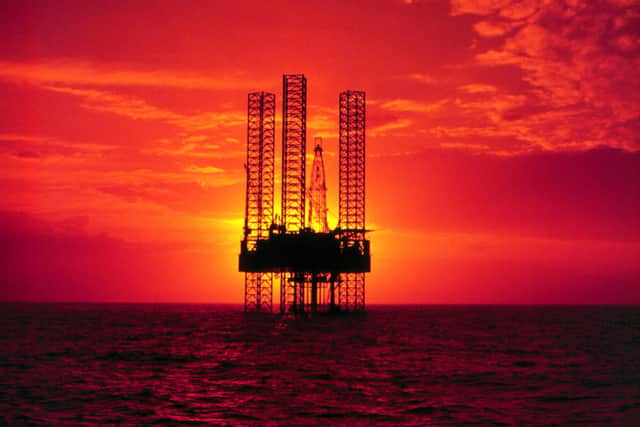Why Nicola Sturgeon's Cambo stance has just encouraged oil companies to look elsewhere than Scotland - Euan McColm
In fact, the First Minister had no formal role at the event during which world leaders gathered to discuss a united response to the unfolding environmental catastrophe.
Prime Minister Boris Johnson told the Scottish Tory conference in 2019 that he wanted Sturgeon nowhere near COP26. Inevitably, since this led to the PM being accused of disrespecting Scotland, he changed his tune.
Advertisement
Hide AdAdvertisement
Hide AdA few weeks before the conference began, Johnson promised the First Minister would have an important part to play.


Johnson, of course, never got round to defining what the First Minister’s important contribution might be.
Perhaps the Prime Minister reckoned that, having been placated with the promise of a role in proceedings, Sturgeon might fade into the background.
Instead, free of any official responsibilities, Sturgeon spent the duration of the conference making speeches, holding press conferences, and ensuring she was photographed with as many key players, including environmental activist Greta Thunberg and US president Joe Biden, as possible.
Johnson’s wish may have been to sideline the First Minister, but instead, he gave he the space to play the part of crusading national leader. While he was locked in lengthy sessions with fellow leaders, Sturgeon sold herself as a great, uncompromising environmental crusader.
The First Minister’s U-turn over the Cambo oil field tells us that she sees mileage in continuing to play this particular part.
Last week, Shell pulled out of the planned development of the site, a decision that followed Sturgeon’s announcement that she was no longer in favour of work proceeding.
Undoubtedly, Sturgeon's decision – and its impact on Shell’s thinking – will enhance her recently-developed reputation as an environmental avenger. But, beyond that, it’s not at all clear what sense her position makes.
Advertisement
Hide AdAdvertisement
Hide AdThere may be some appeal in the simplicity of the Sturgeon position, which seemingly places her at the vanguard of the battle to halt climate change. But a number of SNP politicians and voters disagree with her stance.
These nationalists surely support what Sturgeon has described as a “just transition” from an economy powered by oil to one that is carbon neutral. It’s just that they – quite correctly – think Sturgeon has missed out the transition part.
Destroying the North Sea oil industry – can it really by just seven years since Sturgeon urged voters to back independence on the grounds that oil made Scotland on of the wealthiest countries in the world? – will not, I'm afraid, do much to solve climate change.
Until the point at which we have viable replacements for gas and oil, they will continue to be necessary. Simply switching off production is not an option.
This being so, all Sturgeon’s position on Cambo has done is encourage oil companies to look elsewhere for development opportunities.
Scotland and the UK’s transition away from fossil fuels will not be hastened by a decision not to drill off the north-west coast of Shetland.
Rather than revenues from Cambo boosting Treasury – and ultimately Scottish Government coffers – we’ll have to buy more oil and gas from overseas.
The price for Sturgeon to look like she’s leading the environment – charge will be the removal of job opportunities in the north sea. Scotland will continue to need to use fossil fuels. We'll still be complicit in the damage they cause.
Advertisement
Hide AdAdvertisement
Hide AdCo-leader of the Scottish Green Party, Patrick Harvie, would end all North Sea oil production tomorrow and hang the consequences. His latest pronouncement on the matter is that the desire to extract more oil and gas marks one down as a member of the "far right”.
This sort of bulls**t was quite charming in its way when Harvie was an opposition backbencher, but, after the SNP and the Greens formed a coalition – which they insist isn’t a coalition even though it’s a bloody coalition – he’s a government minister now and we should expect much better.
Sturgeon will surely have winced to hear Harvie’s words. After all, the First Minister may now be the world’s leading environmental campaigner, but the foundations of the SNP's success are years of campaigning on the grounds that the treasure of the North Sea is “Scotland's oil”.
In 2019, half of the gas used in Britain and more than a quarter of the oil was imported from overseas. If development of the Cambo field doesn’t now go ahead – investors in the project, Siccar Point, insist work will continue – that situation will endure.
As many as 100,000 Scottish jobs are said to depend on the North Sea and while Harvie’s lack of consideration for the consequences of those jobs disappearing might be expected, Sturgeon might be wise to adopt a different approach.
The north east of Scotland was once the SNP’s stronghold, a root from which its success flourished. Will Sturgeon’s position on Cambo negatively impact the nationalists’ position in the area?
Her predecessor, Alex Salmond, seems to think so.
How, he asks, will SNP activists defend in the north east a party that wants to shutter the area’s key industry? It would be like former Tory PM Margaret Thatcher campaigning for votes in areas devastated by the closure of coal mines.
Perhaps, in keeping with the insult he likes to hurl at Labour opponents, Salmond sees his former protégé as nothing more than a “yellow Tory”.
Advertisement
Hide AdAdvertisement
Hide AdIf, against the current odds, development of Cambo goes ahead, then there will be hundreds of new jobs in the North Sea.
If, however, the project is scrapped, the quest to become carbon neutral will not be accelerated and Nicola Sturgeon might find once-loyal supporters feel she has abandoned them in the name of winning a few positive headlines.
Comments
Want to join the conversation? Please or to comment on this article.
